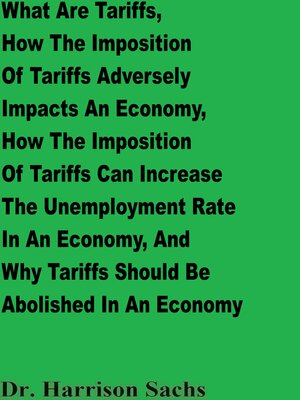What Are Tariffs, How the Imposition of Tariffs Adversely Impacts an Economy, How the Imposition of Tariffs Can Increase the Unemployment Rate In an Economy, and Why Tariffs...
audiobook (Unabridged)
By Dr. Harrison Sachs

Sign up to save your library
With an OverDrive account, you can save your favorite libraries for at-a-glance information about availability. Find out more about OverDrive accounts.
Find this title in Libby, the library reading app by OverDrive.



Search for a digital library with this title
Title found at these libraries:
| Library Name | Distance |
|---|---|
| Loading... |
This audiobook is narrated by a digital voice.
This essay sheds light on what are tariffs, explicates how the imposition of tariffs adversely impacts an economy, demystifies how the imposition of tariffs can increase the unemployment rate in an economy, and elucidates why tariffs should be abolished in an economy. Succinct stated, tariffs are evisceration fees that are imposed by bureaucratic apparatuses in a controlled market economy. In a controlled market economy, tariffs are paid by the importers of products. The importers of products are typically companies. In a controlled market economy, the importers of products do not receive anything for paying tariffs. Furthermore, in this controlled market economy, there are an exorbitant amount of evisceration fees that are imposed by bureaucratic apparatuses which people who work real private sector jobs based on voluntary demand pay and do not receive anything for paying. It is more cumbersome for a person to be able to augment his standard of living if he lacks purview over how all of his hard-earned money is expended. Companies that acquiesce to paying tariffs on their purchase orders are at a high probability to indirectly pass on the cost of paying tariffs on their purchase orders to the members of their target market by significantly amplifying the prices of their products. When companies indirectly pass on the cost of paying tariffs on their purchase orders to the members of their target market by significantly amplifying the prices of their products, then they often do so in a manner that allows them to at least maintain their profit margin per product sold. Companies often prefer to not elicit an extremely low profit margin per product sold. If companies were to have an extremely low profit margin per product sold, it then can undermine their net income potential.







